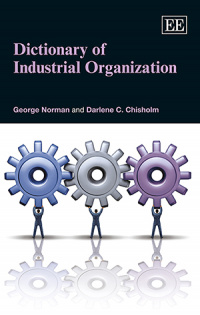Hardback
Dictionary of Industrial Organization
This unique and original Dictionary presents a fully inclusive compilation of foundational concepts, models, methodologies, and applications in the field of industrial organization. It encompasses myriad facets of the topics, from its early days of conception through to modern theoretical and empirical methodologies.
More Information
Critical Acclaim
More Information
This unique and original Dictionary presents a fully inclusive compilation of foundational concepts, models, methodologies, and applications in the field of industrial organization. It encompasses myriad facets of the topics, from its early days of conception through to modern theoretical and empirical methodologies.
The Dictionary balances concise explanation with comprehensive coverage, incorporating concepts such as the structure–conduct–performance paradigm, the development of the theory of the firm, the foundational contributions of game theory and models of strategic interaction. More recent advances in organization theory and managerial economics are also included, as well as current advances in econometrics as applied to industrial organization, and applications to regulation and antitrust analysis.
The Dictionary of Industrial Organization will prove an indispensible reference tool for anyone involved with industrial economics at any level, including academics, researchers, students, consultants and practitioners.
The Dictionary balances concise explanation with comprehensive coverage, incorporating concepts such as the structure–conduct–performance paradigm, the development of the theory of the firm, the foundational contributions of game theory and models of strategic interaction. More recent advances in organization theory and managerial economics are also included, as well as current advances in econometrics as applied to industrial organization, and applications to regulation and antitrust analysis.
The Dictionary of Industrial Organization will prove an indispensible reference tool for anyone involved with industrial economics at any level, including academics, researchers, students, consultants and practitioners.
Critical Acclaim
‘From Abatement to Zone pricing, the reader will find here succinctly yet rigorously defined every concept the IO literature has used in recent years. The natural place for this book is in the reference section of the library, and teachers of courses in IO, industrial economics, imperfect markets and so on will find that placing it into the reading list will ensure students are in a position not to misuse technical language with very little effort. To sum up, this is an essential text, in both meanings of the word: it captures the essence of the discipline, and it will be indispensable to its practitioners.’
– Gianni De Fraja, University of Nottingham, UK and University of Rome “Tor Vergata”, Italy
‘The entries of the Dictionary encompass the development of the field of industrial organization, from its origins with the industry-centric structure–conduct–performance paradigm through the much more firm-centric approach of game theory and insights drawn from contract theory, with its emphasis on the incentives facing individuals. It also touches on the development of empirical methods and the symbiotic relation between industrial organization and antitrust/regulatory policy. The entries that follow expand on this introduction, placing specific industrial organization topics and concepts in the context of the field.’
– Stephen Martin, Purdue University, US
‘. . . an extremely useful reference – an especially valuable resource for practitioners and policymakers in antitrust, and in industrial organization more generally.’
– Paul Klemperer, University of Oxford, UK and former Member, UK Competition Commission
– Gianni De Fraja, University of Nottingham, UK and University of Rome “Tor Vergata”, Italy
‘The entries of the Dictionary encompass the development of the field of industrial organization, from its origins with the industry-centric structure–conduct–performance paradigm through the much more firm-centric approach of game theory and insights drawn from contract theory, with its emphasis on the incentives facing individuals. It also touches on the development of empirical methods and the symbiotic relation between industrial organization and antitrust/regulatory policy. The entries that follow expand on this introduction, placing specific industrial organization topics and concepts in the context of the field.’
– Stephen Martin, Purdue University, US
‘. . . an extremely useful reference – an especially valuable resource for practitioners and policymakers in antitrust, and in industrial organization more generally.’
– Paul Klemperer, University of Oxford, UK and former Member, UK Competition Commission
